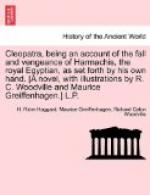“Right,” answered the youth; “but I wish that the Lady Charmion was the sorceress. I would stare her out of countenance, I warrant.”
I took him by the hand and gazed deep into his eyes. “I see,” I said, “a field of battle at night, and about it bodies stretched—among them is thy body, and a hyena tears its throat. Most noble Sir, thou shalt die by sword-thrusts within a year.”
“By Bacchus!” said the youth, turning white to the gills, “thou art an ill-omened sorcerer!” And he slunk off—shortly afterwards, as it chanced, to meet this very fate. For he was sent on service and slain in Cyprus.
“Now for thee, great Captain!” I said, speaking to Paulus. “I will show thee how I will pass those gates without thy leave—ay, and draw thee through them after me. Be pleased to fix thy princely gaze upon the point of this wand in my hand.”
Being urged by his comrades he did this, unwillingly; and I let him gaze till I saw his eyes grow empty as an owl’s eyes in the sun. Then I suddenly withdrew the wand, and, shifting my countenance into the place of it, I seized him with my will and stare, and, beginning to turn round and round, drew him after me, his fierce face drawn fixed, as it were, almost to my own. Then I moved slowly backwards till I had passed the gates, still drawing him after me, and suddenly jerked my head away. He fell to the ground, to rise wiping his brow and looking very foolish.
“Art thou content, most noble Captain?” I said. “Thou seest we have passed the gates. Would any other noble Sir wish that I should show more of my skill?”
“By Taranis, Lord of Thunder, and all the Gods of Olympus thrown in, no!” growled an old Centurion, a Gaul named Brennus, “I like thee not, I say. The man who could drag our Paulus through those gates by the eye, as it were, is not a man to play with. Paulus, too, who always goes the way you don’t want him—backwards, like an ass—Paulus! Why, sirrah, thou needst must have a woman in one eye and a wine-cup in the other to draw our Paulus thus.”
At this moment the talk was broken, for Charmion herself came down the marble path, followed by an armed slave. She walked calm and carelessly, her hands folded behind her, and her eyes gazing at nothingness, as it were. But it was when Charmion thus looked upon nothing that she saw most. And as she came the officers and men of the guard made way for her bowing, for, as I learned afterwards, this girl, next to Cleopatra’s self, wielded more power than anyone about the palace.
“What is this tumult, Brennus?” she said, speaking to the Centurion, and making as if she saw me not; “knowest thou not that the Queen sleeps at this hour, and if she be awakened it is thou who must answer for it, and that dearly?”
“Nay, Lady,” said the Centurion, humbly; “but it is thus. We have here”—and he jerked his thumb towards me—“a magician of the most pestilent—um, I crave his pardon—of the very best sort, for he hath but just now, only by placing his eyes close to the nose of the worthy Captain Paulus, dragged him, the said Paulus, through the gates that Paulus swore the magician should not pass. By the same token, lady, the magician says that he has business with you—which grieves me for your sake.”




